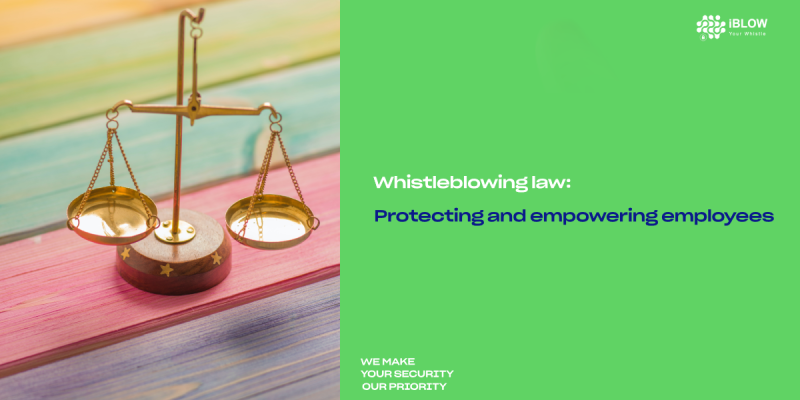Interest in the whistleblowing law and its application in Portugal has been growing and more and more companies have implemented the necessary processes and/or are aware of the requirements, added value and what to do to comply with it – however, the respective implementations may be underway, as are many entities seeking to learn more so that they can deal with these processes as soon as possible and thus be able to protect and empower their employees and their organization with its benefits.
Let’s start by looking at a few key points, the Whistleblower Act, also known as the Whistleblower Protection Act or the Whistleblowing Act, is legislation that aims to protect and empower employees who report irregularities, misconduct, or crimes in their organizations.
It is part of a set of laws whose main objective is to promote transparency, responsibility and ethics in companies and institutions.
The Whistleblowing Law (Law no. 93/2021, of December 20) transposes into national law Directive (EU) 2019/1937 of the European Parliament and of the Council on the protection of persons who report breaches of European Union law.
This law establishes the general regime for the protection of whistleblowers of infringements, which are acts or omissions contrary to rules or standards relating to various areas, such as public procurement, financial services, product safety, environmental protection, public health, consumer protection, protection of personal data, financial interests of the European Union, internal market rules and organized crime.
The purpose of the law is to ensure the protection of individuals who report or publicly disclose an offense that has been committed, that is being committed or can reasonably be foreseen to be committed, as well as the attempt to conceal it, based on information obtained during their professional activity.
The law allows whistleblowers to use internal channels (within the public or private entities where they work or collaborate) or external channels (with the competent authorities) to report infringements. The law also allows for the public disclosure of infringements in certain circumstances, such as when internal or external channels do not work or when there is an imminent or manifest risk to the public interest.
Whistleblowing can be beneficial for employees in many ways. By reporting a breach, the employee can help prevent financial and reputational damage to the company, as well as protect the public interest. In addition, the whistleblowing law (Law no. 93/2021, of December 20) establishes a general regime for the protection of whistleblowers, which guarantees whistleblowers a set of rights and guarantees, such as the confidentiality of their identity, non-retaliation by the entities involved, legal and psychological assistance, compensation for damages suffered and exemption from civil, criminal, or disciplinary liability for whistleblowing.
Here is a summary of some of the main aspects of the Whistleblowing Act that aim to protect and empower employees:
- Protection against retaliation: The law explicitly prohibits retaliation in any form, such as dismissal, harassment, or discrimination, against whistleblowers.
- Confidentiality and anonymity: The identity of the whistleblower is protected and kept confidential and can also be kept completely anonymous if the whistleblower so wishes. In addition, the confidentiality of information related to the whistleblower may be protected by law, if this is necessary for the investigation.
- Legal and psychological assistance: The whistleblower is entitled to free legal and psychological assistance to deal with the consequences of the report.
- Compensation for damages suffered: The whistleblower is entitled to compensation for damages suffered because of the whistleblowing.
- Exemption from civil, criminal, or disciplinary liability for the report: The whistleblower cannot be subject to any kind of sanction or punishment for having made the report.
- Anonymity: The law may allow whistleblowers to remain anonymous, ensuring that they do not suffer retaliation for exposing wrongdoing.
- Secure whistleblowing channels: The law requires certain organizations to establish secure and confidential whistleblowing channels where employees can report wrongdoing without fear of reprisals (find out if this applies to you).
- Rewards or incentives: Some whistleblowing systems may include rewards or incentives to encourage employees to report illegal activities.
- Training and awareness: Organizations may be obliged to provide training and awareness of whistleblowing legislation to employees, so that they know how to proceed and what their rights are.
- Impartial investigation: The law may require that complaints are investigated impartially and thoroughly, with the guarantee that the organization takes appropriate measures to resolve any irregularities identified.
- Public disclosure: In some cases, the law may allow relevant information to be disclosed to the public, especially if the whistleblowing involves issues of public interest.
- Corporate responsibility: Organizations can be held responsible for failing to comply with the provisions of the law, which can include financial penalties.
These laws are important for promoting integrity and accountability in companies and institutions, while protecting whistleblowers willing to report wrongdoing. They play a key role in preventing and detecting fraud, corruption, and other forms of organizational misconduct.
By implementing a good management tool for your whistleblowing channel, you will be giving your employees (and beyond, such as external service providers, customers, suppliers, etc… depending on the configuration of your implementation scenario) the necessary protections and capacities for action so that they feel positively compelled to act (and do so) for the sake of defending:
- evolution,
- the protection of interests,
- the optimization of processes,
- the positive development of the level of ethics,
- increasing transparency,
- early resolution of possible internal problems,
- preventing internal matters from damaging the image and reputation,
…of the organization that will receive the report in question. We believe that with these processes taking place in more and more organizations, we will all be contributing to a more evolved society, with higher levels of ethics, increased transparency and greater reputation, these values will cut across the entire society in which we live.
Thank you, we hope we’ve helped you.
Would you like to know more? Schedule a chat with us!
Published in: 07/09/2023
